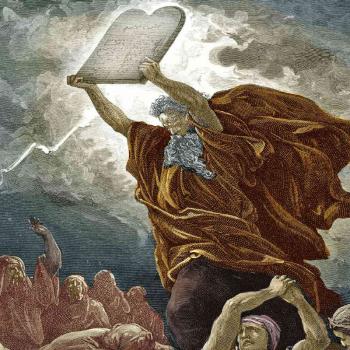Lectionary Reflections
Genesis 32:22-31
August 3, 2014
This Sunday brings us to that passage of the long Genesis saga that has perhaps generated the largest number of sermons that any Genesis text has brought forth. It has been known by many different names: "Jacob wrestles with an angel"; "Jacob wrestles with God"; "Jacob wrestles at Peniel," as my NRSV has it. It is well to remind ourselves that such "chapter titles" were not part of any ancient means of identifying the content of biblical texts; they are very modern additions by collectors and translators, designed to suggest what a reader is about to read. They can be seen as innocuous claims, or they could be seen as roadblocks to a new hearing of the text at hand. I would suggest that those familiar titles for this mysterious passage are obstacles that may obscure the full riches that this pericope can offer the preacher. "Jacob wrestles with a man" is in fact what the text itself says, but even that designation may stand in the way of a fuller understanding.
Let's read the text again, employing, one hopes, the "second naiveté," requested by Paul Ricoeur; that is, we want, as much as we can, to approach this overly familiar text with fresh eyes, the better to be able to hear something fresh in the words. "He (Jacob) got up that night and took his two wives, his two maids, and his eleven children, and forded the ford of the Jabbok" (the words for "ford" and "forded" are from the same Hebrew root – Gen. 32:23 [Hebrew, v. 22 in English]). "He took them and forded them across the stream, and forded what was his, too. Jacob was left alone" (Gen. 32:23-24). The scene is very well painted for us. The long and noisy trek from Haran, a journey of some days, characterized by the loud hooves of fine livestock, in effect stolen from Uncle Laban, the clamoring protestations of two sister-wives and two very intimate maids, and the fuss and bother of eleven howling children, ends suddenly at the ford of the Jabbok, a small stream emptying into the Jordan River from the east.
After sending this motley company across the stream, Jacob finally finds himself alone. It must have been a blessed moment, as he listened to the jarring sounds of his huge family fade into the distance.
But out of nowhere, Jacob is jumped by "a man" who "wrestled with him until the breaking of the day" (Gen. 32:24). There is apparently no time at all between the disappearance of Jacob's retinue and the attack of the man. The Hebrew clearly says "man," not angel, not God. And the man "wrestles" (ye'hbek), a word suspiciously close consonantally to Jacob's own name (y'acob). We should perhaps stop here in the story and inquire after the possible identity of this man.
With whom might we expect the rascal Jacob, the "grabber" of birthright and blessing from brother and father, the clever one who took family and goods from Laban with a series of ruses, to wrestle? Three possible suspects have just been named: Esau, Isaac, Laban. Has not Jacob wrestled with each of these and won? Yet, we ought not overlook another possibility: Jacob himself. Finally, is it not Jacob who needs to battle his own grasping life in order to discover his place in the ongoing story of Israel and God's choice of them? Any of these four might prove adversary to battling Jacob.
"When he (the man) saw that he was not able to beat him (Jacob), he struck him on the hip socket, pulling Jacob's hip out of joint as they wrestled" (Gen. 32:25). Whoever the man is, he soon realizes that he cannot easily or fairly best Jacob, who is a formidable wrestler, so he resorts to what must be seen as a dirty move. He grabs the ball of his hip and rips it out of joint. I am always reminded when I read this part of the story of my days watching old-time wrestling on our tiny black-and-white TV in the 1950s. Mr. Moto, the inscrutable Asian (racial stereotyping was seldom frowned on in those long ago days), would apply "the claw" to his opponent's stomach, sending him into a peaceful sleep. It was unethical, raising a chorus of boos from the raucous TV crowd, joined by a ten-year-old viewer at home. But it was effective, and Mr. Moto regularly won his matches, if the script so determined, of course.
But the hip socket trick is not effective, and Jacob still holds on. The man then tries another tactic. "Let me go, for the day is breaking," he screams, but Jacob retorts, "I will not let you go unless you bless me" (Gen. 32:26). One wonders if this unknown man is rather like Dracula or the Wolfman, whose exposure to the sun will bring their demise? But whoever he is, Jacob shows his true colors with his demand for a blessing; that is the grabber we know, one who has scratched and clawed his whole life to get what he wants.
"Then he (the man) said to him (Jacob), 'What is your name?' And he (Jacob) replied, 'Jacob.' He (the man) said, 'You will no longer be called Jacob, rather Israel, because you have struggled with God and with human beings, and have won'" (Gen. 32:27-28). It is hard to gauge the astonishment of that sentence. Jacob has won the match with the man, and the man has announced the victory by saying he has in fact won against God and humans, and as a result will henceforth be known as Israel, which might mean "struggler with God" or "God struggles." Whichever it means, Jacob has come out victorious.





